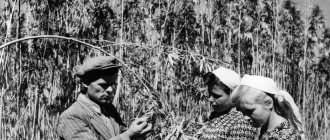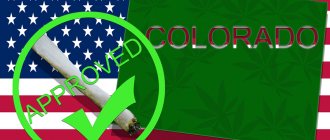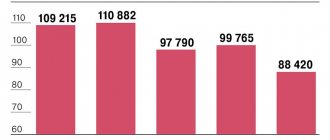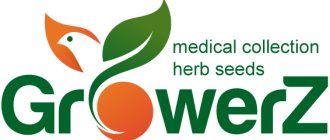Art. 231 of the Criminal Code of the Russian Federation implies liability for growing plants that are classified as narcotic or contain substances that have an effect similar to that of a narcotic. With this article, the state regulates the responsibility of citizens in the sphere of drug trafficking and suppresses attempts to grow such plants for the purpose of further sale.
Multi-channel free hotline Legal advice on criminal law. Daily from 9.00 to 21.00 Moscow and region: +7 (495) 662-44-36 St. Petersburg
Is it possible to grow hemp?
Hemp, marijuana and other plants of this type contain the narcotic substance tetrahydrocannabinol. The legislation of the Russian Federation defines responsibility for the cultivation, storage and distribution of plants containing narcotic substances. We will tell you in this article what punishment can be applied for growing hemp.
Is it possible to grow hemp for personal use?
Federal Law No. 3 clearly establishes a ban on the cultivation of narcotic plants for any purpose. Since cannabinol is contained even in hemp seeds, it cannot be grown.
There is also a list of prohibited plants No. 934, in which this plant also appears.
The qualification of violation of these prohibitions depends on the number of plants:
- Less than 20 bushes are considered insignificant in size. Responsibility will arise under Article 10.5.1 of the Code of Administrative Offenses of the Russian Federation. This article provides for a fine of 1.5-4 thousand rubles or arrest for 15 days.
- When growing more than 20 bushes, liability will arise under Article 231 of the Criminal Code of the Russian Federation. They can be punished with a fine (up to 300 thousand rubles), compulsory labor (up to 480 hours), restriction or imprisonment (up to 2 years). However, if the crime is committed by several people, the prison term will increase to 8 years with a possible additional restriction of freedom for 2 years.
- Particularly large size (more than 330 bushes) is punishable under the same article 231, but only by imprisonment for 8 years. Even a small sprout of hemp is considered a bush.
Answering the question whether it is possible to grow hemp, it becomes clear that liability is provided for by law in any case and often a “lover” of weed can be imprisoned for a long time.
Can they be planted for buying or selling hemp seeds?
Since hemp seeds also contain a narcotic substance, albeit in small quantities, there is also liability for trading in them.
Government Decree No. 460 of 2007 approved a list of permitted hemp varieties that contain a minimum cannabinol content. Such varieties can be sold, but only for industrial purposes, and if there are documents confirming that the seeds belong to this particular variety.
The following gradation has been established for the THC (tetrahydrocannabinol) content in hemp seeds:
- Significant size - more than 0.05 grams.
- Large size - more than 0.25 grams.
- Particularly large - more than 50 grams.
What is the deadline for purchasing hemp seeds?
The buyer of seeds whose THC content exceeds the established standards will be prosecuted under Article 228 of the Criminal Code of the Russian Federation.
With a significant amount of THC content, it faces:
- Fine up to 40 thousand rubles.
- Mandatory work up to 480 hours.
- Correctional labor for up to 2 years.
- Restriction and imprisonment for up to 3 years.
A large amount entails imprisonment from 3 to 10 years with an additional fine of half a million rubles, as well as restriction of freedom for a year.
A particularly large amount is grounds for imprisonment for 10-15 years, with an additional fine in the amount of 500 thousand rubles and restriction of freedom for 1.5 years.
In the event that the amount specified by law is not exceeded, the buyer will only be brought to administrative liability under Article 6.8 of the Code of Administrative Offenses of the Russian Federation. In this case, a fine (4-5 thousand rubles) or arrest for up to 15 days may be applied as punishment.
What is the deadline for selling hemp seeds?
The seller of seeds of prohibited varieties of cannabis will be punished more harshly than the buyer. Article 228.1 of the Criminal Code of the Russian Federation provides for imprisonment for 4-8 years with an additional restriction of freedom for 1 year.
However, there are aggravating circumstances:
Have a question for a lawyer? Ask now, call and get a free consultation from leading lawyers in your city. We will answer your questions quickly and try to help with your specific case.
- Telephone in Moscow and Moscow region
- Phone in St. Petersburg and Leningrad region: +7 (812) 603-78-25
- Free hotline throughout Russia
- Sales to educational institutions, public and government institutions, recreational facilities, transport and correctional institutions.
- Use for selling media and information networks.
In these cases, the term of imprisonment will be assigned within the range of 5-12 years, with a possible additional fine of 500 thousand rubles and a year of restriction of freedom.
Trafficking by a group of people, as well as the significant amount of THC in the seeds, is also an aggravating factor. This is punishable by imprisonment for up to 15 years with a limit of up to 2 years.
Use of official position, as well as large and especially large amounts of THC content can lead to a 20-year prison sentence, a fine of one million rubles, as well as an additional ban on working in a specific area for 20 years.
What is the punishment for using weed?
In addition to punishment for growing hemp, Russian legislation provides for liability for its use. This responsibility is quite mild; the consumer will be punished under the Administrative Code. However, you need to remember that there is criminal liability for possession of marijuana or hemp.
Under the Code of Administrative Offences, the following may be punished:
- Under Article 6.9 for using drugs at home. This will result in a fine of 4-5 thousand rubles or arrest for 15 days. Foreigners will face deportation.
- Under Article 20.20 for consumption in a public place. The punishment is identical to the previous article.
- According to Article 20.22, if a minor used cannabis in a public place. Parents or guardians will be required to pay a fine of 1.5-2 thousand rubles.
Unlike criminal liability for more serious drug-related crimes, administrative penalties are quite mild.
Criminal liability for marijuana
For a number of actions with marijuana, Articles 228 and 228.1 of the Criminal Code of the Russian Federation provide for punishment. The following actions are criminally punishable:
- Manufacturing and processing of drugs.
- Storage.
- Transportation.
- Distribution, including free.
It is important to understand that while there is no criminal penalty for the use of marijuana, there is one for its possession. In practice, it is difficult to imagine use without storage.
What weight of marijuana is punishable by criminal charges?
According to Government Decree No. 1002, the following quantities of stored drugs are established, on the basis of which a specific punishment is assigned:
- Significant size - 6 grams.
- Large – 100 grams.
- Extra large – 100,000 grams.
The punishment can be significantly increased in case of large and especially large quantities of drugs seized.
Punishment for possession of marijuana
As mentioned above, the punishment depends on the size of the drug stored:
- If the amount is significant, the maximum penalty is imprisonment for up to 3 years. But more often they impose correctional, compulsory labor, a fine or restriction of freedom.
- If the amount is large, imprisonment will be mandatory - up to 10 years. Additionally, a fine of up to 500 thousand rubles will be applied and freedom will be limited for a year.
- A particularly large size will result in a sentence of 10 to 15 years. If there are mitigating circumstances, the court may limit itself to the minimum figure.
Punishment for distribution of marijuana
Selling any drugs is the most serious crime. The fact that marijuana is a so-called soft drug does not reduce the degree of punishment:
- According to the first part of Article 228.1 of the Criminal Code, sales will be punished with 4-8 years in prison.
- The significant amount of the drug increases the possible sentence to 8-15 years.
- Large size - up to 10-20 years.
- Particularly large - up to 15-20 years.
Is it possible to legally grow hemp in the Russian Federation?
Hemp (Cannabis) is an annual herbaceous plant with characteristic “seven-fingered” foliage. It is dioecious, that is, for reproduction it requires pollination of females by males (but recently breeders have also bred parthenocarpic species). You can find wild hemp in most regions of Eurasia.
The plant's fiber structure has much in common with nettle and flax, so historically in central Russia it was actively grown for the production of ropes and fabrics. In pre-revolutionary literature, for example, one can find expressions like “hemp shirt” - that is, made from male hemp.
However, in the twentieth century, this herb became known, first of all, not as a raw material for industry, but because of the content of cannabinoids in it - psychotropic substances on which the specific effect of marijuana and hashish on humans is based.
If the drug content in wild hemp is minimal, then throughout the 20th century, varieties were bred through selection specifically for the purpose of being used as psychotropics.
Thus, cannabis is included in the list of prohibited substances, the trafficking of which is being combated by the state.
Over the past two decades, some states and regions have legislatively changed their attitude towards hemp. Let’s say that in the modern Czech Republic you can grow five bushes “for yourself”, and there is a cafe with virtually legalized smoking.
In this regard, many Russian citizens are beginning to develop the false feeling that hemp is no longer considered a drug, which means that “nothing will happen” for its cultivation. Indeed, the legislation in the Russian Federation in relation to cannabis has changed, softening the punishment for hemp, but “grass” is still included in the list of prohibited substances.
Even more confusion arises due to the fact that on open sale you can find, for example, hemp porridges and breads, as well as eco-clothing made from this plant (by the way, of high quality and quite expensive).
And among vegans and raw foodists, hemp seeds are very popular, used as a biologically active food supplement.
Hemp also serves as a raw material for a number of medicines; you can even find arthritis creams based on it.
Therefore, this article will dot all the i’s and describe in detail the attitude of the law in the Russian Federation to the cultivation of hemp.
Legal status of hemp in Russia
Marijuana in Russia is a prohibited substance. It is included in the so-called “first list” of drugs. Since 2010, smoking a joint as such is not punishable by law, with the exception of consumption in public places. But the cultivation of hemp, its cultivation, improvement, transportation, storage and sale are prohibited.
The softening of the legislation in 2010 was that now, with minimal quantities that fit within the logic that a person took cannabis exclusively for personal high, instead of criminal punishment, he faces only a fairly lenient administrative one.
Only particularly large cultivation plots and batches of storage, transportation, distribution, etc. now fall under the Criminal Code. (more about their sizes below).
But at the same time, hemp is still grown in Russia for use as an industrial raw material, the manufacture of medicines and other “non-narcotic” purposes.
According to the law, only businesses with a special license can legally plant, process and use hemp.
If we are talking about medicinal raw materials (cannabinoids are part of many pharmaceuticals) or scientific research, then only state enterprises (federal state unitary enterprises) are engaged in agricultural cultivation and processing of cannabis under the strict control of internal affairs bodies.
In 2022, the expansion of these areas was considered at the legislative level due to the fact that sanctions against the Russian Federation on the world stage have reduced the supply of foreign medicines, and they have to be imported.
If we are talking about raw materials for textiles, ropes, food products, insulation in construction, etc.
, then according to the law, enterprises must grow hemp only of special varieties with a minimized content of cannabinoids, and sell it in a processed form that excludes use “for a high.” There are such factories in Mordovia, Nizhny Novgorod region and other regions of Russia.
Yes, there are seeds among their products, but they have already been processed so that they will not sprout. They are used for feed, for the production of oil, products, or as dietary supplements for raw foodists and vegans.
To avoid confusion, the concepts in the English language were even separated - the narcotic plant began to be called only cannabis, and industrial crops were still called hemp.
However, it will not work to deceive an ordinary citizen by saying that the “personal plot” is intended for ropes and a shirt, because:
- there is no special permitting license;
- will “give out” a high content of cannabinoids during analysis, which is excluded in industrial crops.
Responsibility for growing hemp according to the law in the Russian Federation
There are many countries where marijuana is legalized, including as an agricultural crop. But the Russian Federation is not one of such states. In Russia, unauthorized landings are still strictly prohibited. It doesn’t matter whether it’s growing hemp on a windowsill at home, a couple of bushes in a greenhouse or a hectare on a farm. The size of the plantation will only affect the severity of the punishment.
Regulations
The prohibition of hemp falls under Article 10.5.1. “Illegal cultivation of plants containing narcotic drugs or psychotropic substances or their precursors” of the Code of Administrative Offenses.
The term “cultivation” in it means both cultivation itself and selection, breeding new varieties, experiments with the selection of fertilizers, watering, lighting to obtain a better harvest.
As we have already mentioned, only federal state unitary enterprises with a special license can do this in Russia.
Amendments to the legislation appeared thanks to the Federal Law of May 19, 2010 No. 87 “On amendments to certain legislative acts of the Russian Federation on the issue of cultivation of plants containing narcotic drugs or psychotropic substances or their precursors.” But they only concern the abolition of criminal prosecution for a minimum amount of cannabis. Unauthorized (including home) cultivation of cannabis remains prohibited.
Penalty for growing cannabis at home
Liability for marijuana depends on the quantity. For storage, sales, and transportation, the following gradation has been introduced:
- a small amount (up to 6 grams);
- significant (from 6 to 100 grams);
- large batch (more than 100 grams);
- especially large batch (from one hundred kilograms).
When growing, the calculation is different. It doesn’t matter whether a person has planted one bush or more – cultivation is still considered illegal. But if a personal plantation contains less than 20 bushes, then the punishment will be exclusively administrative: a fine of 1,500 to 4,000 rubles or 15 days of arrest.
That is, the answer to the question: “Is it possible to grow hemp at home?” in any case - “No!” But there will be no criminal case for a few bushes.
If the police find more than two dozen bushes (that is, we are clearly not talking about personal “pleasure”), then the punishment will be imposed according to the Criminal Code, and, naturally, it will be much more severe:
- imprisonment or restriction of liberty for up to 2 years;
- community service (up to 480 hours);
- a large fine (from 40 to 300 thousand or up to two annual salaries).
In aggravating circumstances (sales via the Internet, distribution in educational institutions, organized group, repeated recruitment, etc.), the term may increase to 8 years.
Works in the trash
The Hempico cooperative has been engaged in hemp production since 2022. According to project manager Sergei Savenkov, industrial hemp is one of the most promising areas in agriculture. Although industrial hemp farming existed successfully in the Soviet Union, in modern Russia it is developing practically from scratch, and the niches of possible products from the crop are empty. However, Hempico plans to become profitable only this year. The first years were spent developing the scientific and technical base together with institutes, and the cooperative began to monetize its products only recently.
One of the company's achievements was hemp tea. There are several types of it in the Hempico collection. Each product description states that the product contains less than 0.1% THC and less than 1% CBD (cannabidiol). The company claims in its advertising materials that tea relieves anxiety, promotes weight loss and sound sleep, protects the nervous system from degeneration and is good for the heart.
Hempico tea was developed two years ago together with the Krasnoyarsk State Agrarian University. The partners conducted numerous studies to prove the nutritional value of the product. Before entering the market, Hempico voluntarily underwent an examination to ensure the legality of the tea. Then the company conducted a psycholinguistic analysis to ensure that the design of the product did not fall under Article 6.13 of the Code of Administrative Offenses of the Russian Federation (propaganda of narcotic drugs). We entered the market carefully, having discussed with representatives of the State Administration of the Ministry of Internal Affairs of Russia that the cooperative would act transparently, through notifications, and thereby encourage new market players to behave in the same way.
Sergey Savenkov
head of the cooperative Hempico
In 2022, new participants began to enter the market, picking up our “invention,” and all our work was thrown into the trash. The product is very specific, and here you need to use your head, understanding that supervisory authorities are also involved in this matter. Someone came in on the hype: they say, we are now going to organize legalization - the emphasis was placed incorrectly. Our negotiations with such companies did not lead to anything, and as a result there was a sharp negative effect - everyone lost.
By negative effect, Savenkov means the refusal of marketplaces to sell products, the detention of sellers, and the complaint of Safe Internet League activists to the Ministry of Industry and Trade with a request to introduce pre-moderation of ads in online stores. Volunteers of the organization pointed to the facts of “the sale of narcotic substances under the guise of food products by individual sellers in the largest online stores Ozon and Wildberries.” The Ministry of Industry and Trade, in turn, sent an appeal to the Ministry of Internal Affairs.
"More than just a mistake"
In addition to the unprofessional behavior of market players, another factor played an important role, says the head of Hempico - the decree of the President of the Russian Federation on the Strategy of State Anti-Drug Policy until 2030. This is an updated version of the previous document, which was valid until 2022. The new decree has strengthened anti-drug policy, says Anastasia Ichetovkina, legal consultant at Mi& Ko. New measures include identifying and suppressing the operation of Internet resources used to promote and distribute drugs, the formation of anti-drug commissions, attracting volunteers to implement policies, developing systems for monitoring the drug situation, and others.
Sergey Savenkov
head of the cooperative Hempico
One of the market participants had their products blocked on the marketplace. He flew to Moscow and began, roughly speaking, to download his license. He did this unprofessionally and was unable to protect this product, that is, an ordinary seller who does not understand the production process decided to justify the legality of the product. His unprofessionalism caused a chain reaction.
We are talking about Maxim Shevchenko, the founder of the company, which, according to Kontur.Fokus, is engaged in growing tea. He was caught in March 2021 with more than thousands of tea bags. According to the Ministry of Internal Affairs, it contained marijuana, or tetrahydrocannabinol (THC). True, its quantity was not measured (the permissible content is no more than 0.1%). Another reason why tea is controversial may be that it looks similar to marijuana.
Sergey Larin
founder of HempForLife
As far as I understand, the examination was carried out not on the amount of THC in hemp, but on its presence. Even if the THC content is lower than permitted, the test will still show that it is present. This is a very significant thing because people are subject to a criminal offense, and in terms of numbers the law has not been broken. It’s like this everywhere with hemp: it seems possible, but it’s not.
The case is still under investigation, one of the market players reports. According to the source, the problem may be “more than just a mistake by the Ministry of Internal Affairs”; most likely, there is a problem with documents, because it is impossible to make a narcotic drug from industrial hemp itself. At the time of publication of the material, the Ministry of Internal Affairs did not respond to Inc.’s about the status of the case.
In addition, at the end of March, the Abakan City Court began an administrative case against Altuma LLC for promoting narcotic drugs. The reason was an appeal received by the Main Directorate of the Ministry of Internal Affairs with a request to check hemp tea, which is sold on various sites, including large marketplaces Ozon and Wildberries. The brands “Big Shoe” and “DoctorDja” (owned by Altuma) raised questions: their names hint at narcotic varieties of hemp, and the tea packages depict leaves and inflorescences of the plant. As a result, the court dismissed the case because the website hemp-chai.rf , where the products were located, does not belong to Altuma.
Scared marketplaces
In the footage published by IA Khakassia Live, you can also see the inspection of Wildberries, which took place earlier, in February 2022. After this, the marketplace informed sellers that it would not list hemp products or products with hemp in their packaging. However, Wildberries now has a variety of hemp products (including food) other than teas. The same thing applies to Ozon and Yandex.Market. And on SberMegaMarket and AliExpress you can also buy Hempico tea.
When asked why Wildberries abandoned hemp teas, the head of the company’s press service, Valery Prokopyev, says: “Food products are still a special segment,” that is, there are more requirements for them. As for hemp teas, the question for him is whether they are allowed for sale in the Russian Federation.
Sergey Savenkov
head of the cooperative Hempico
At first, the wave was entirely for all industrial hemp products, then they returned in larger quantities to marketplaces: oil, seeds and flour, but not tea. Marketplaces saw this as risks and possible losses due to the suspension of their activities. The guys were simply scared. Although, while this whole story was happening, we were quietly selling our products through the website and other small marketplaces, and continued to work with distributors.
Due to the negative wave, sales of Hempico tea fell by 80%. Marketing investments in the product turned out to be unprofitable, and refocusing on other sales channels, according to Savenkov, will not return the former customer loyalty to tea. At the same time, the entrepreneur believes that such reactions from the Ministry of Internal Affairs enlighten people and teach them to work correctly.
Promising market
The market for hemp products in Russia was growing rapidly until 2022. If in 2010 less than a thousand hectares of industrial hemp were sown, then in 2022 - already 10.5 thousand hectares, and the market for hemp food products has grown 4 times over the past three years. This is influenced by the newness of the industry and the growing trends towards healthy lifestyles and environmentally friendly products.
One of the few full-cycle players in this market is the Konoplex holding, which has been engaged in hemp production since 2015 and produces food and fiber from industrial hemp. The company's total investment in the industry exceeds 2 billion rubles.
Last year, Konoplex opened a plant in the Penza region for the production of healthy food products from hemp and other crops, investing 300 million rubles in the enterprise. The products are produced under the Konoplyanka and Kitchen of Happiness brands and are available on various trading platforms, including Ozon, Wildberries and Yandex.Market.
Konoplex does not see any special relationship between marketplaces and hemp products. At the same time, the company notes: the controversial reputation of hemp and the excessive attention of some departments to legal products have a negative impact on the market.
Milena Alexandrova
General Director of Management Company "Konoplex"
It is necessary not only to clearly distinguish between the concepts of narcotic and non-narcotic industrial hemp, but also to carry out extensive information work with representatives of government agencies, businesses and consumers. We are carrying out this work together with the Agro-Industrial Association of Hemp Growers (APAC), talking about the crop, its capabilities, areas of application, and beneficial properties.
Floating hemp field
HempForLife has been involved in hemp products since 2013. It was launched after founder Sergei Larin visited a manufactory in Nepal that makes clothes from hemp. He liked that it was cozy, or “warm,” as the entrepreneur says. Larin first sold imported hemp clothing, and then launched his own production. Later, the range was expanded to include food and cosmetics. HempForLife received its first profit five years after its launch.
Even though Larin and his team had never been in the tea business, his business also suffered. At the beginning of the year, HempForLife decided to place its textiles on Wildberries. According to Larin, at first the marketplace approved the delivery and accepted the goods into the warehouse, and the next day announced: “No, we will not sell your items because they contain hemp fiber.” What is wrong with hemp fiber has not been explained.
Sergey Larin
founder of HempForLife
Three pallets of our goods were stuck at Wildberries, and we still haven’t received them back. The company responds to us once a month that it cannot yet return the goods.
Upon request from Inc. Wildberries responded that they would contact HempForLife and find out what happened. “I was already planning to write a complaint to them,” Larin reacts.
HempForLife products can be found on Yandex.Market. The company has not yet placed its products on Ozon, but plans to do so. According to Larin, the marketplace has banned teas, and for other food products it is asking for tests for THC content (in seeds, kernels). Ozon did not comment on Inc. its policy regarding industrial hemp products.
Due to the vagueness of concepts, HempForLife has difficulties promoting products. The Law on Advertising prohibits advertising of plants containing narcotic drugs and their parts. According to Larin, the social networks VKontakte, Facebook, and Instagram do not advertise products with hemp. It is also difficult to advertise through Google and Yandex, even if the content talks about the technical part of the product and its legality. For sites, these are serious risks and fines, explains Larin.
Advertising products made from industrial hemp on VKontakte is not prohibited, but moderators carefully monitor the content of ads, the press service of the social network says. Cosmetics, clothing and food products made from industrial hemp are moderated. The social network will reject the ad and regard it as propaganda if it contains images or references to plants that are directly or indirectly related to narcotic substances. “The advertiser can always receive an explanation and recommendations on how to adjust the ad so that it complies with the rules of the social network,” says the VKontakte press service.
Sergey Larin
founder of HempForLife
There are many problems and difficulties in the hemp market - with cultivation, processing, technology. The most important thing is that there are no clear regulations and norms in terms of the separation of concepts. And in such a floating field, people do not understand what is legal and what is not. These include officials, marketplaces and other companies.










